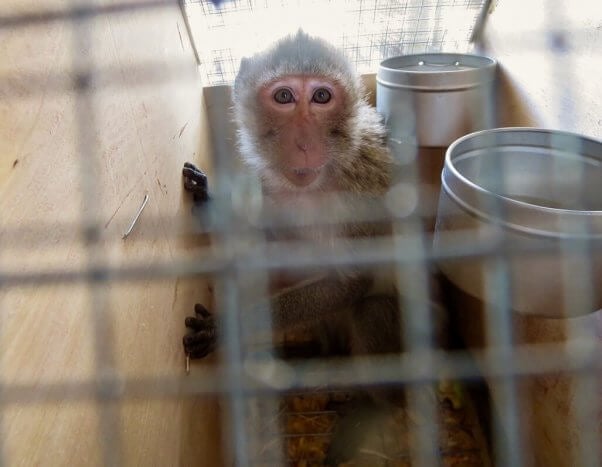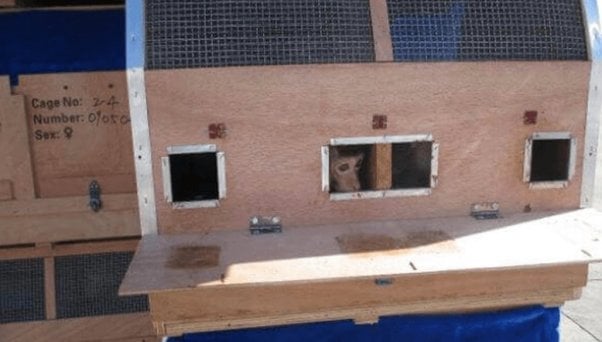VIDEO: Proposed Monkey Prison’s CEO Lies About His Role in Envigo Beagle Case
Update (February 12, 2024): A new video created by PETA exposes the lies that Safer Human Medicine CEO Jim Harkness has been telling Bainbridge residents. He was the chief operating officer of Envigo, whose Cumberland, Virginia, beagle-breeding facility eventually closed after a PETA undercover investigation, federal citations for more than 70 violations of animal welfare laws, and an investigation by the U.S. Department of Justice that exposed many sick and injured animals. Under Harkness, Envigo wanted to sell the beagles to laboratories, but a federal judge prevented that. Envigo agreed to close in order to resolve the government’s lawsuit. Nearly 4,000 dogs were freed for adoption.
Update (January 25, 2024): PETA has learned that members of the Decatur County Board of Commissioners held an illegal meeting during which they voted to approve a 20-year tax abatement scheme worth at least $58 million to lure a dangerous company into town to construct the largest monkey prison in the U.S.
The public was given no advance notice of the December 11 meeting, violating Georgia’s Open Meetings Act. The move means that the vote to approve the sweetheart deal to attract a monkey warehouse capable of holding 30,000 primates is invalid. A new vote hasn’t been scheduled—but it could be.
PETA attended the Decatur County Board of Commissioners meeting on January 23 along with 150 residents, whose message was loud and clear: They don’t want the waste, the noise, the disease risk, or the cruelty in their county. Stay tuned for more.
Please TAKE ACTION below to keep the heat on public officials.
Original Post:
PETA has discovered that officials in a tiny Georgia town and surrounding county have agreed to cough up more than $58 million in incentives, hand over 200 acres of public land, and even design community college courses specifically tailored to one company’s needs in a bid to secure the construction of the largest monkey prison in the U.S., capable of holding twice as many monkeys as there are city residents.
We need your help to persuade city officials that this is a bad deal for both monkeys and residents.

What We’re Up Against
Former executives of Charles River Laboratories, Envigo, and Covance recently formed a deceptively named company—Safer Human Medicine Inc.—with plans to build a colossal monkey-holding and -breeding facility in Bainbridge, Georgia, a town of fewer than 15,000 residents, located 40 miles north of Tallahassee, Florida.
The planned facility is gigantic. If built, it would be the largest monkey-holding facility outside Asia. The next-largest U.S. facility imprisons about 7,000 monkeys. The proposed Bainbridge operation would hold 30,000. That’s two monkeys for every resident of the city.
If carried out, the proposal—codenamed “Liberty,” without a shred of irony—would inflict nearly incalculable damage on already endangered monkey populations worldwide, risk spreading disease throughout the country, and spell ecological disaster for the residents of surrounding Decatur County.
How Did This Happen?
In August 2023, company representatives solicited bids from towns in several states interested in hosting its monkey prison, which would import, breed, and cage monkeys destined for experiments in laboratories throughout the U.S.
Bainbridge and Decatur County were among the bidders. Here’s what they promised:
- Huge tax breaks
- Zero property taxes for the first 10 years
- Graduated tax rates for the next 10 years (The company wouldn’t even start paying full property taxes until the 21st year of operation.)
- Value: More than $56 million
- Cost to company: $0
- 200 acres of public land
- Value: $2 million
- Cost to company $10
- Construction of a supply system for clean water, a new wastewater system, and roads leading to the facility
- Cost to company: $0
- New internet, telephone, and natural gas infrastructure
- Cost to company: $0
- To waive all permit and development fees, including utility tap fees
- Cost to company: $0
- Financing assistance
- Cost to company: $0
- To conduct an environmental impact study, with limited cleanup of site, if necessary
- Cost to company $0
- Access to Congressional lobbyists for additional tax incentives
- Cost to company: $0
- Custom-designed training programs from two local colleges
- Cost to company: $0
They won the bid. Small wonder, with that stack of goodies.
What Does This Mean?
For perspective, the total 2024 expenses for Bainbridge—including its payroll and every service the city government provides—is $43 million. It has promised a single company 36% more than the city spends to operate for an entire year, just so that it will set up shop.
The Bainbridge city budget is supported by a total of $8.8 million in property taxes from all residential and commercial property, according to the 2024 spending plan. The agreement to build a monkey prison supplying laboratories with thinking, feeling individuals to torment and kill gives away more tax revenue to a single company than the city could collect from its residents in nearly seven full years.
Meanwhile, residents are expected to continue paying full freight. That’s a terrible deal.
Heard enough? Jump down to the bottom of this page to TAKE ACTION immediately. Or keep reading to find out more about this calamitous proposal.
Potential Spread of Disease
The Centers for Disease Control and Prevention (CDC) warns that imported primates—especially long-tailed and rhesus macaques—significantly threaten public health. One or both of these species would be imprisoned at the proposed facility.

PETA has obtained CDC documents showing that in recent years, there’s been a significant uptick in the arrival in the U.S. of monkeys infected with Burkholderia pseudomallie, tuberculosis, malaria, and other deadly pathogens and diseases. Life-threatening pathogens and diseases such as the herpes B virus, Ebola-like viruses, tuberculosis, and others that monkeys pick up overseas can spread to humans and other animals. Although monkeys brought into the U.S. are supposed to be screened, these diseases often go undetected.
Environmental Pollution
The proposed facility would generate massive amounts of biological waste on a scale never before seen in the U.S.
According to the company’s own projections, when the facility reaches full capacity, it would generate 444,000 gallons of wastewater a day. That’s nearly enough monkey saliva, feces, urine, blood, and other bodily fluids to fill an Olympic-size pool, every day—all of it potentially harboring pathogens.
That’s also 20 times the amount of waste generated by the next-largest monkey-holding facility. Located in Alice, Texas, it has struggled mightily to keep up with its waste, trucking away overflow loads every day.
Wildlife, including birds and insects, could consume soil and water contaminated by the vile facility, increasing the risk of passing parasites, viruses, and bacteria to humans. Mosquitoes feeding in the area could transmit malaria or other diseases between the monkeys and humans. And large colonies of captive monkeys have been implicated in local parasite transmission cycles for Chagas disease.
Monkeys Escape
It’s alarmingly common for monkeys to escape captivity. In Texas, four baboons escaped from the Texas Biomedical Research Institute in 2018 and were spotted by drivers on the highway, and several chimpanzees had escaped earlier from the University of Texas MD Anderson Cancer Center. A monkey who escaped from the Yerkes National Primate Research Center in Georgia was never found.
And there’s more:
- Two dozen monkeys took refuge in a local forest after escaping from Tulane National Primate Research Center in Louisiana.
- Nine monkeys believed to be infected with herpes B escaped from the Oregon National Primate Research Center, and one of them evaded capture for three days.
- A truck carrying 100 monkeys crashed on a Pennsylvania highway in 2022, exposing responders to the bodily fluids of the recently imported animals.
Bad Actors
The leaders of Safer Human Medicine are former executives from Envigo, Charles River, and Covance, companies that profit from animal misery and are in charge of facilities that have faced federal citations for repeated violations of the most basic federal animal welfare regulations.
Jim Harkness, CEO
Harkness was chief operating officer at Envigo, which breeds, procures, and sells animals, including monkeys, for experimentation. He was in charge of animal research models when the company’s beagle-breeding facility in Virginia was raided by the U.S. Department of Justice (DOJ), which found and seized hundreds of dogs in acute distress:
- Harkness tried to persuade Virginia state lawmakers not to pass a bill that would protect dogs after PETA exposed Envigo and its dozens of violations of the federal Animal Welfare Act.
- He failed. The bill passed with unanimous votes in the state house and senate.
- At the request of the DOJ, a U.S. district court then permanently barred the Envigo facility from “any activity requiring [a federal Animal Welfare Act] license.”
- The facility shut down and released nearly 4,000 beagles, who were then adopted into loving homes.
- The DOJ in Miami subpoenaed Envigo during Harkness’ tenure, requiring it to turn over documents related to the importation of monkeys into the U.S. originating from or being shipped through Cambodia, China, or Vietnam.
David Johst, President
In 2019, Johst retired as executive vice president of Charles River Laboratories, which has a sordid history of violating animal welfare regulations and damaging fragile ecosystems. It’s currently under federal investigation by the DOJ, the U.S. Fish & Wildlife Service (FWS), and the U.S. Securities and Exchange Commission related to the alleged illegal smuggling of long-tailed macaques, an endangered species, from Asia to sell to U.S. laboratories. Charles River is also attempting to set up a similar monkey facility in Brazoria County, Texas, where the county commissioners recently passed a unanimous resolution voicing their and their constituents’ opposition to the proposed project.
Kurt Derfler, Chief Operating Officer
Derfler retired as executive director of nonhuman primate operations at Charles River in May 2023. During his tenure, the FWS denied entry to more than 1,000 long-tailed macaques allegedly illegally imported by the company into the U.S. from Cambodia.
- He was previously vice president of North American operations at Envigo and executive director of operations at Covance before Envigo took it over.
- Derfler’s dates of employment at Covance, like those of Harkness, match nearly perfectly with the dates of the grand jury subpoena.
Stop the Proposed Monkey Prison
Laboratory experimentation is among the chief drivers of monkey extinction around the world, and facilities such as the one proposed in Bainbridge contribute to the problem and inflict a magnitude of suffering that’s nearly unimaginable.
Instead of pouring money into more pointless experiments on animals, resources should be redirected to fund superior, animal-free methods that could actually produce effective treatments for people who desperately need them.
Please TAKE ACTION today and let Bainbridge city councilors know the proposed monkey prison is a terrible deal for monkeys and residents.
Using our sample letter below, please e-mail them today. You can copy and paste the following block of e-mail addresses in the “To” field of your e-mail to contact the entire committee with one message:
[email protected], [email protected], [email protected], [email protected], [email protected], [email protected], [email protected], [email protected]
Please feel free to use our sample letter, but remember that using your own words is always more effective.

